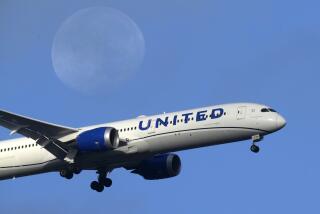Complex frequent flier programs’ points go to waste
- Share via
The nation’s first frequent flier program launched 30 years ago this month and, by most accounts, the programs have only gotten more complicated with age.
When American Airlines introduced its frequent flier program in 1981, the concept was simple: Passengers received free tickets or upgrades based on how many miles they had flown.
Today the programs are more complicated, with some airline passengers getting reward points for flying, staying at hotels, renting cars and using certain credit cards.
A study published last month in the Journal of Consumer Psychology found that members of these so-called loyalty programs are more likely to spend their reward points if it’s easy to understand the savings they will receive.
When the savings are hard to calculate, the study found, people tend to stockpile the points — even keeping them until they expire.
“Points are more likely to be spent when consumers can easily understand the benefits they can get with the points,” according to the study by Jessica Y.Y. Kwong of the Chinese University of Hong Kong and other researchers.
The findings were no surprise to Randy Petersen, founder of FlyerTalk, a website about frequent flier programs. He estimates that up to a third of the members of most frequent flier programs don’t understand the rewards plans.
Petersen doesn’t blame the increasing complexity of the programs on the airlines. Partnerships among airlines, hotels, car rental companies and credit cards make most frequent flier programs as difficult to understand as the stock market, he said. “It seems like these programs trip up even the smartest people.”
• Crises draw attention to travel insurance
Political tensions in the Middle East and North Africa and recent natural disasters around the world have put great pressure on emergency travel assistance firms that evacuate clients living or traveling abroad.
But the crises have also helped drive business to firms that offer such services under travel insurance policies.
Air Partner Inc. in Britain and On Call International in New Hampshire, for example, have been scrambling since December, ferrying clients out of political hot spots and disaster zones in places like Egypt, New Zealand and Japan.
Air Partner evacuated more than 12,000 clients from Japan, Tunisia and Egypt over the last four months, said company President Philip Mathews. “This year, we’ve had one thing after another,” he said.
On Call International evacuated 300 people from Egypt after protests erupted in January.
“It was the sheer volume of people that made it difficult,” said company President Michael J. Kelly.
Still, he said, the crises brought attention to the benefits of travel insurance.
“For us, the phone has not stopped ringing with businesses looking to purchase political and natural disaster insurance,” Kelly said.
• Survey reveals interesting tidbits
Most surveys of American travelers focus on attitudes toward travel costs, favorite hotel amenities and top vacation destinations.
But a recent survey by TNS Global Market Research in London came up with a few interesting results, including regional preferences for dealing with children. The online survey of 1,000 Americans was commissioned by Marriott International Inc.’s SpringHill Suites brand.
Among the findings:
When vacationers’ children become unruly, the top three responses were yelling at their kids (15%), taking deep breaths to calm down (13%) and simply ignoring the youngsters (10%). Southerners prefer the deep-breathing technique; Midwesterners are more apt to yell.
Before traveling, 38% of men get a haircut, and 28% of women do the same.
And when it comes to personal routines, 24% of Americans from the Northeast said they would not put off shaving during a vacation, while 26% of Southerners wouldn’t go without praying.
More to Read
Inside the business of entertainment
The Wide Shot brings you news, analysis and insights on everything from streaming wars to production — and what it all means for the future.
You may occasionally receive promotional content from the Los Angeles Times.










